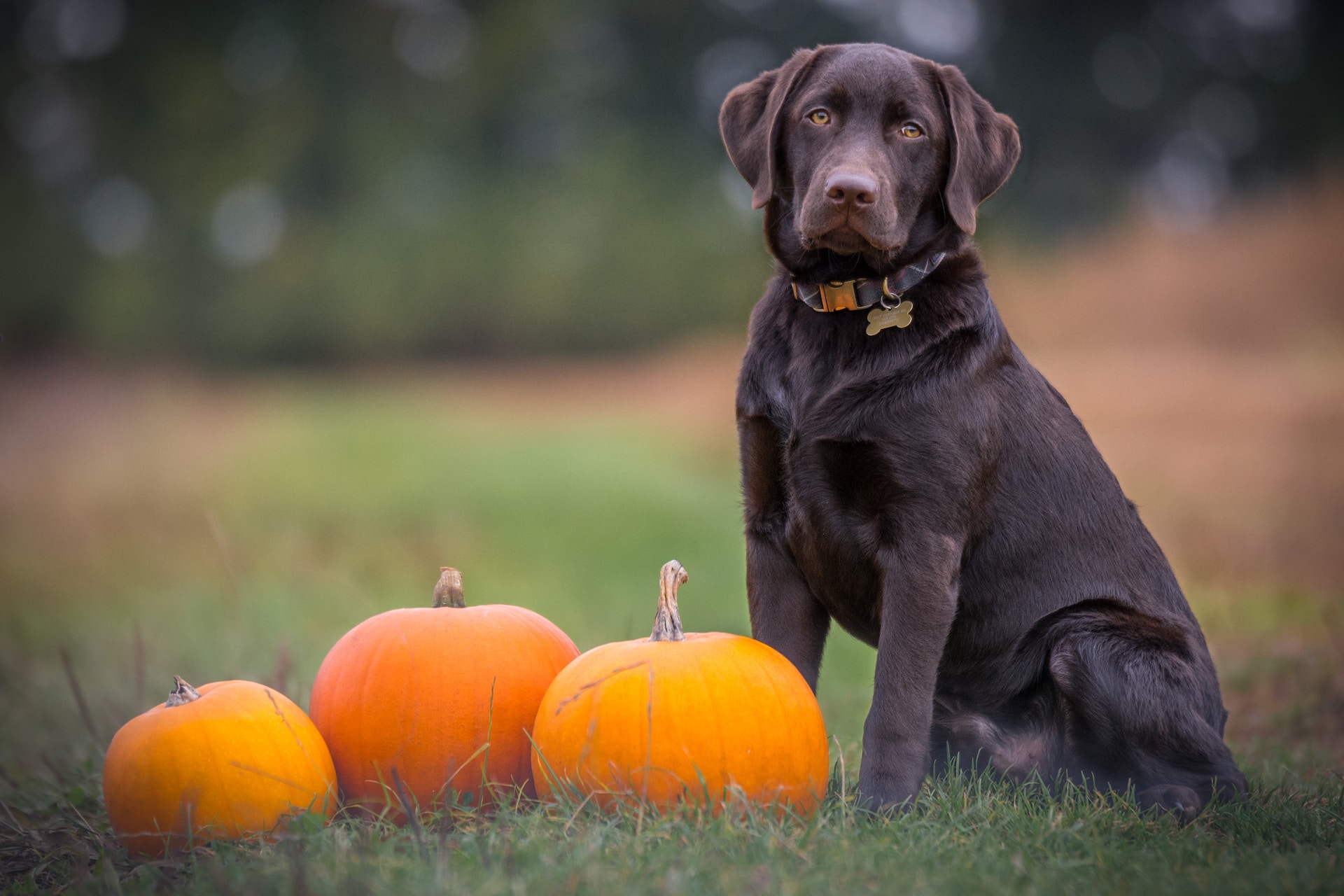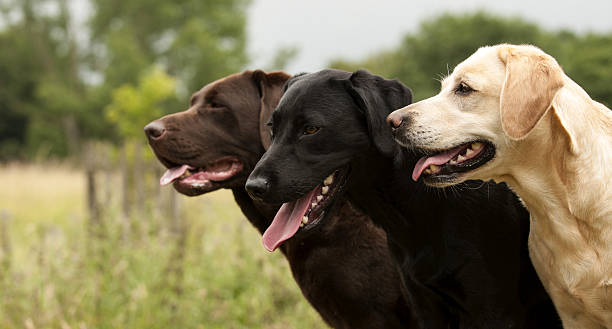Unraveling the Remarkable Intelligence of Labrador Retrievers
Do you want to explore the remarkable Labrador Retriever intelligence? Labrador Retrievers are pleasant, lively, and friendly dogs. They exhibit every desirable quality and characteristic of an excellent family dog. That they are the most popular breeds of dogs in America is therefore not surprising. But is their popularity due to their intelligence?
One of the smartest breeds of dogs is the Labrador Retriever. They rank as the seventh brightest canines when comparing “obedience and working intelligence,” or the capacity to learn orders. However, the Labrador’s better retrieving instincts and natural ability to fit in with people, circumstances, and places truly distinguish them as clever dogs. In addition to being extremely obedient, Labrador retrievers possess a high level of general canine intelligence. In this article, let’s examine the factors that make Labrador Retrievers among the world’s smartest dog breeds. So let’s get started!
What Exactly Does Being Intelligent Mean?
The definition of the word “clever” is hotly contested. Many psychologists believe that dividing intelligence into multiple categories will assist children and adults since it will allow individuals to identify their strengths and limitations rather than categorizing them as “smart” or “not smart.”
Howard Gardner, a psychology professor at Harvard, divides into eight categories of intelligence: logical-mathematical, musical, linguistic, spatial, interpersonal, intrapersonal, bodily-kinesthetic, & naturalistic.
According to Gardener’s concept of intelligence, a person might struggle in one area while displaying genius-level brilliance in another, and neither qualifies the other. We can estimate the relative intelligence of canines, including Labrador Retrievers, using a breakdown of the many forms of intelligence.
Why Labrador Retrievers Are Intelligent
There are a lot of factors that make labs such clever canines. Coren’s evaluations, however, only evaluated OW intelligence, which is only one component of genuine canine IQ. It should come as no surprise that it is the most impartial method of assessing dog intellect.
However, Stanley Coren acknowledges that dogs possess adaptive and intuitive intelligence. Both of which are considerably more crucial for determining a dog’s intelligence. As you would have predicted, the two other Intelligence kinds are significantly harder to assess.
Retriever’s Intelligence
Dogs were developed for certain intrinsic skills or abilities, referred to as instinctive intelligence. Dog breeds were once selected for certain functions and tasks. Dogs were developed to serve a variety of purposes, including herding livestock, serving as guardians, and hunting partners. Poodles, for instance, were developed as water retrievers. This unique kind of intellect is required by their basic inclinations to collect things or games from water. Or consider the Border Collie, which can drive and push sheep independently with little or no human instruction.
Labradors were also developed to be water retrievers in a similar manner. In actuality, they were first employed by nearby fishermen for fishing. The Labrador was among the most obedient, water-savvy, and agile dogs. They were thus among the greatest “fish retrievers” in the entire planet. Because of their physical attributes, labs are the best water dogs. They have short coats that keep them buoyant while floating in the water and double coats that are water-resistant and serve as insulation in the chilly waters.
These canines, as well as the majority of water retrievers, have webbed toes, which may surprise you. This peculiar quality enables them to swim swiftly and effectively while recovering objects from the sea. These characteristics make Labradors the best dogs for hauling nets to the boat or rescuing escaping fish. Even though most Labradors no longer retrieve the game, the instincts remain. Their innate intelligence, however, will always remain high. When playing catch with your Lab, have you ever discovered that they are natural? Well, this is the reason.
Adaptive Intelligence
On the other hand, adaptive intelligence refers to the Labrador’s capacity for independent learning. Does your Lab have a knack for fixing issues? Do people gain knowledge from prior errors and experiences? These are all excellent inquiries to determine a canine breed’s intelligence.
In many respects, intuitive intelligence is simpler to gauge. But with adaptable IQ, that’s different. Although individual dogs’ levels of this intelligence can vary widely, most owners regard Labradors as possessing high levels of adaptive intelligence. Without a doubt, tremendous adaptive intelligence is required for this Lab to have learned how the mechanism for locking operated in such a short amount of time. Many canines with little adaptive intelligence never attempt to solve issues like unlocking doors.
Like other Labradors, Erik was well aware of his owner’s behavior. Thus, It is not surprising that he could learn this so rapidly. A dog with a low adaptive IQ may spend years watching the action and never learn how to unlock the door. These are all excellent instances of Labrador Retrievers having high levels of adaptive intelligence. Even if these are only two instances, you can easily discover dozens of stories of this nature. Ask any Lab owner, and you’ll hear stories similar to these! However, these dogs excel in working/obedience, innate intelligence, and adaptable intelligence.
Instinctive Intelligence
The task or aptitude that a dog breed was raised for is referred to as its instinctive intelligence. The fact that Labrador Retrievers were initially developed to assist fishermen in the water means they have the intrinsic ability to swim and retrieve objects from the water on their own.
Even though Labrador Retrievers are typically kept as family pets in modern times, this does not indicate that they lack the innate intellect of other dogs. You probably already know how proficient your dog is at fetching games if you’ve ever participated in one with them. Observe the operation of one’s innate intellect here!
How to Measure the Intelligence of Your Labrador Retriever
Dogs are becoming a more common topic in animal intelligence tests than rats and monkeys have historically been, particularly in the last 20 years. A border collie named Rico dazzled scientists in 2004 with his 200-word vocabulary & propensity to remember the name of an object after only one attempt. Since then, there has been a steady increase in interest in canine intelligence and language processing skills. Any scientist that studies intelligence will tell you that the term refers to various forms of intelligence.
While your Lab won’t be immersed in a Fitzgerald book, we may divide canine intelligence into two main categories:
Instinctive Intelligence – The breed and kind of dog determine a pup’s instinctive intelligence. Over many ages, dogs were bred for certain skills. As a result, a beagle would likely score better on a cognitive exam focused on scent, whereas a greyhound would do better on a test focused on sight.
Adaptive Intelligence – The second type of intelligence, known as adaptive intelligence, is determined by each dog’s capacity for learning. This skill spans a wide range, from social and environmental learning to task learning and language understanding. Your smart Lab may excel at learning tasks but fail miserably at picking up on linguistic clues, just as you could have excelled at AP English but failed miserably at AP Calculus.
According to researcher & psychologist Doctor Stanley Coren of the University of British Columbia, dogs are as bright as young children (particularly those aged 2 to 2.5 years).5 Nevertheless, he noted the extraordinary intellect of dogs in a variety of contexts, including:
Numbers
Some canines with high intelligence can count to four or five and spot simple math mistakes (1+1=1 instead of 1+1=2).
Language
A typical dog is capable of learning 165 phrases and gestures. Like the well-known Rico, dogs with IQs in the top 20% can memorize up to approximately 250 words. Even the literal meaning of symbolic notions can be understood by them.
Spatial Awareness
Dogs pick up on and recall different pathways in their surroundings, how to use basic devices like door knobs, and where you keep their favorite items, such as rewards.
Deception
Even dogs can lie. Dogs can deceive both people and other dogs. This is typically conducted motivated by rewards (consider snacks).
Similar to how dogs behave, a lot of knowledge about the intelligence of various dog breeds is passed down orally. However, two hundred eight dog behavior judges from the US and Canada did rate well-liked breeds according to intellect.
The top seven breeds with the highest intelligence were found to be:
•Labrador retriever
•Border collie
•Poodles
•Dobermans
•Shetland sheepdogs
•German shepherd
•Golden retriever
Chocolate, yellow Labrador, & black lab owners can be happy with the seventh position. However, other factors contribute to a dog’s intellect besides breed. A 2016 research conducted by British psychologists examining 68 border collies showed the degree to which breeds can differ in intellect. The study identified the canine “g” factor as a canine intelligence factor in general.
How to Tell if Your Labrador Retriever Is Smart
It is well known that Labrador Retrievers are intelligent and easy to teach. Here are some clues as to whether your Labrador Retriever is intelligent.
Emotional Intelligence
It’s a common misconception that all dogs care about their owners’ mental health, but that’s not always the case. Labs are renowned for sensing when their owners are depressed, anxious, or needing consolation. Because of this, Labrador retrievers are frequently utilized in therapy work.
Other indications that your Labrador is intelligent include nudging your hand to get your attention or showing concern when luggage is brought out. Breeds that are emotionally savvy can recall your daily activities and routine. When circumstances change, they draw on their understanding of their owner’s emotions to make attempts at consoling them.
Solving Puzzles
Dog owners frequently consider puzzle toys for dogs to occupy them while you are gone. However, dog puzzles may do much more for you & your dog than just this. The ability to solve a reward puzzle is a key sign of canine intelligence and predicts success in search & rescue training and obedience training.
If you’re wondering how intelligent Labradors are, they can solve a puzzle! To recall the procedures needed to complete a problem, higher-level cognitive abilities are needed; thus, if your dog possesses these abilities, they are one clever Labrador!
Skills Retention
Your Labrador is a brilliant canine friend if it can pick up a trick fast and remember it weeks later! Remember that each dog is an individual, & high energy lab may appear to be learning things slowly just because they are so animated.
Labradors are frequently sufficiently intelligent to comprehend a trick even when their owners’ training methods are inconsistent. Due to their inherent memory for orders and actions over time, Labradors make ideal assistance dogs and partners for hunting. Observing how quickly a Labrador can pick up a new trick can answer any queries regarding the breed’s intelligence.
Open and Locks
The smartest canines in any group can frequently work locks and unlock doors, despite the uncomfortable situations that might result from this intelligence-based talent. Many canines that can operate basic equipment and machinery pick them up by seeing their owners use them first. These puppies are frequently chosen from each litter by Labrador breeders that aim to produce working dogs because of their talent!
Thankfully, by setting expectations during regular training sessions, you can quickly educate your dog never to use their talents to unlock doors and locks. If you are worried about them going outdoors, you may also put a wireless fence in your yard.
Looks to You and Follows You
An attentive Lab that looks to you for direction is one of the finest signs of intelligence. The capacity to learn is boosted in dogs that desire to follow their owners’ and trainers’ instructions, and they are far more likely to achieve in picking up orders fast and without repetition.
A dog who likes your company & lets you control its behavior also builds a more profound and lasting attachment between you and your dog. There is nothing like having a dog so emotionally attached to you that communicating is practically simple! The fact that Labradors are such a well-liked breed is largely due to this breed trait.
Training an Intelligent Dog
How do you use your dog’s incredible canine intellect to teach them new abilities now that you’ve established it exists? Training is one of the most crucial duties of dog ownership, which may also be one of the most rewarding aspects.
Like many dog breeds, a clever Labrador requires a certain training approach. If you can adapt your training strategies to your dog’s particular learning style, you will have the best success in training them. Fortunately, Labs are quite easy to teach things to, and I like doing things right. This makes them incredibly great partners if your objective is to train!
Be Persistent
Recall that we mentioned the emotional intelligence of Labrador Retrievers! As a result, you will need to teach your Labrador with patience and refrain from letting your feelings get in the way. Hard emotions, irritation, or fury may all quickly disrupt a training session. A sensitive dog, such as a lab, will also reflect your feelings back to you. This implies that when you teach your dog new abilities or tricks, you must be conscious of your emotions.
Express Gratitude
A high-drive dog like a Lab doesn’t value undeserved praise very much. Ensure you do it properly if you intend to compliment someone for a job well done or reward behavior. Since labs are sensitive animals, sincere compliments or a quick pat on the head are frequently more than enough to motivate them.
If praise is offered to labs in a loud, eager voice, they may become pushy or too excited. The misuse of rewards to convey intentions sometimes confuses them. Keep in mind that these dogs are perceptive and may sense your emotions. Sometimes a pat on the head and a smile are considerably more motivating than a reward.
Ways to Maintain Labrador Retriever’s Brain Healthy
It’s crucial to keep your dog interested at all times, but this is truer the older they become. With aging, cognitive capacities inevitably deteriorate in ways such. Regardless of their age, as a pup parent, you undoubtedly want to keep your dog happy and healthy. There are four techniques to safeguard your dog’s mental faculties:
Physical Activity
Your dog’s health, which affects its cognitive abilities, depends on regular exercise and agility competitions. It also keeps them cognitively active, avoids a variety of health problems in Labrador retrievers, and stimulates their minds.
Training
No of their age, keep your dog interested in training new abilities. Additionally, it will deepen your relationship with your dog. Even naming new toys that you buy for your dog will help him learn new terms.
Excellent Nutrition
According to research, diet may affect how dogs’ cognitive function ages. Foods containing medium-chain triglycerides can be a great alternate energy source for aged dogs, particularly since they have a diminished capacity to utilize glucose for energy. Find out here how to change your dog’s food properly.
Playtime
Another technique to keep your dog intellectually active is to play with them. Games like hide & seek allow you to go above and beyond. Divide up your dog’s food and position it in various locations throughout the home, or hide their favorite toy & help them find it. Each of these four techniques encourages your dog’s physical and emotional well-being.
Frequently Asked Questions
How smart are Labrador retrievers?
The ideal dog for families and individuals new to dog ownership, labs are known for their trainability & work ethic and great innate intelligence and adaptable intelligence.
Are Labradors more intelligent than golden retrievers?
Labradors and Golden Retrievers are quite intelligent, but Golden Retrievers come out on top regarding intelligence. Golden retrievers are the 4th most intellectual breed, whereas Labradors are ranked seventh in Dr. Stanley Coren’s evaluation of dog intelligence.
Which dog is the smartest?
The Border Collie is the dog breed with the highest IQ, followed by the German Shepherd, Poodle, and Belgian Malinois. Dogs exhibit a variety of intelligence, including emotional intellect, problem-solving skills, obedience, and innate intelligence.
What makes Labrador retrievers unique?
The fact that they want to work with people contributes to their intelligence and relative ease of training. They are “simple keepers” and risk gaining weight if not given the proper amount of activity and food quantities. Due to their want to be around people and the fact that many do not fare well in kennels, labs make wonderful family dogs.
Which color Labrador is smarter?
The brightest dog is also what you want if you want your Labrador to be your best buddy, helper, and guard. No, a Labrador retriever’s IQ is not determined by the color of its coat, to give you a quick answer. The answer is that the Labrador retriever breeder & breeding are everything.
Final Thoughts
Let’s say you want to expand your family with a Labrador Retriever. If so, you’ll discover a great, understanding, and friendly family member in it. Labradors will fit right into your family with their kind dispositions and sharp minds. They are also quite bright. Your pet will still be the finest dog in the world, regardless of where they rank on the intelligence scale. I want you to understand that acquiring the ideal dog involves more consideration than just IQ; energy level, temperament, and lifestyle suitability are all as crucial.








